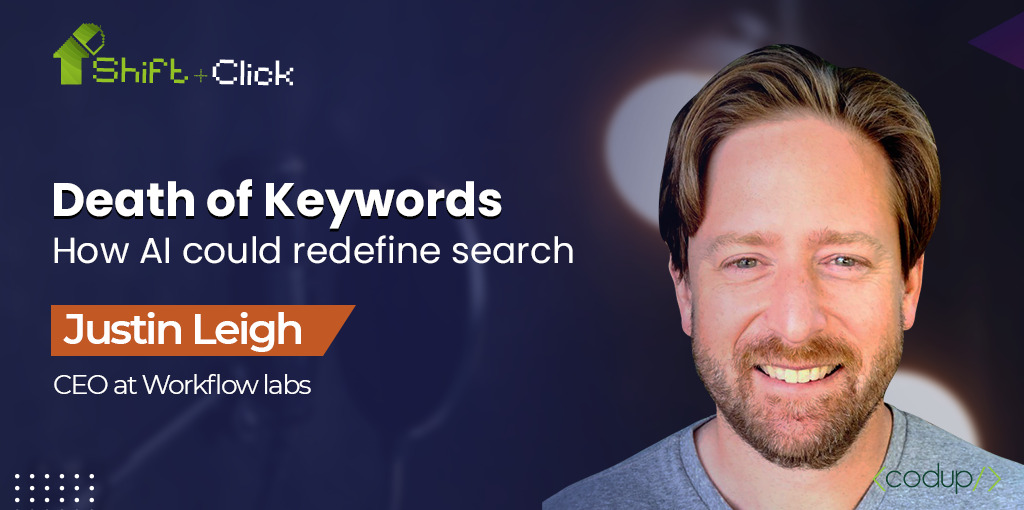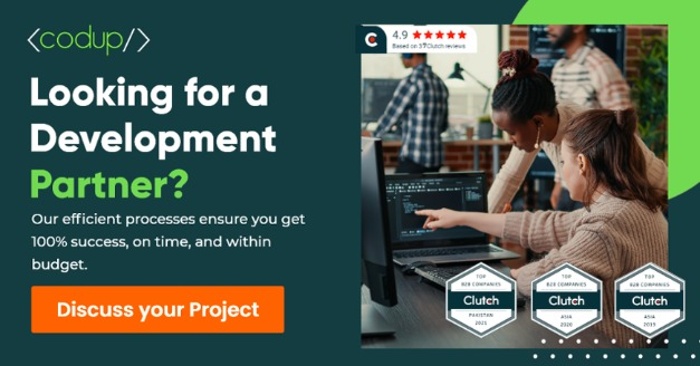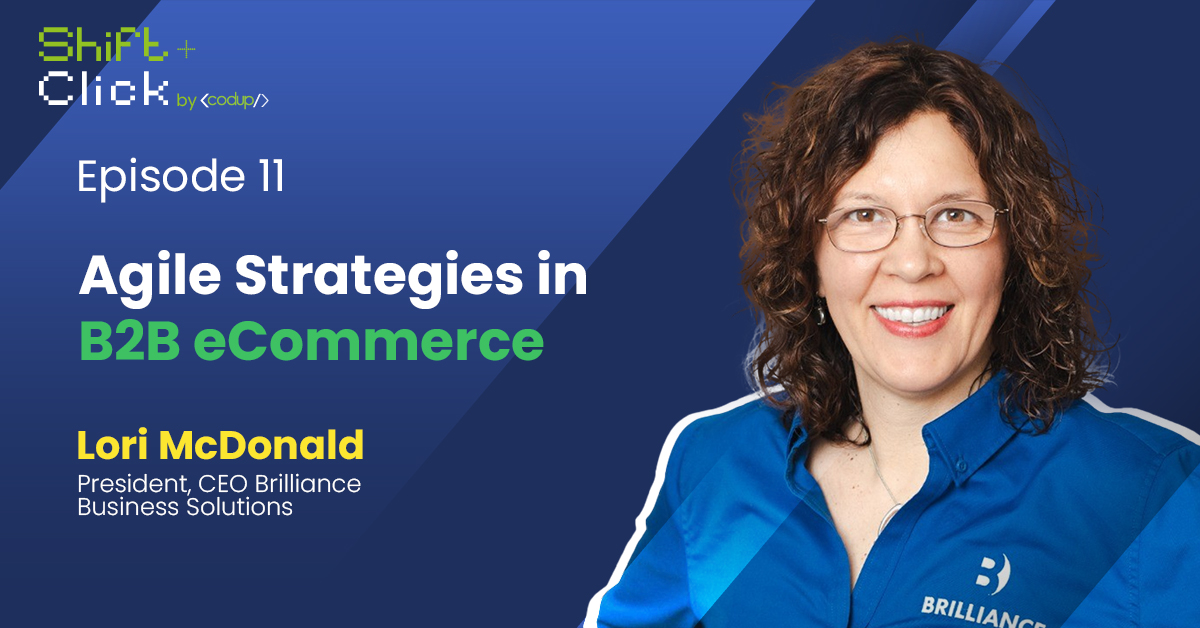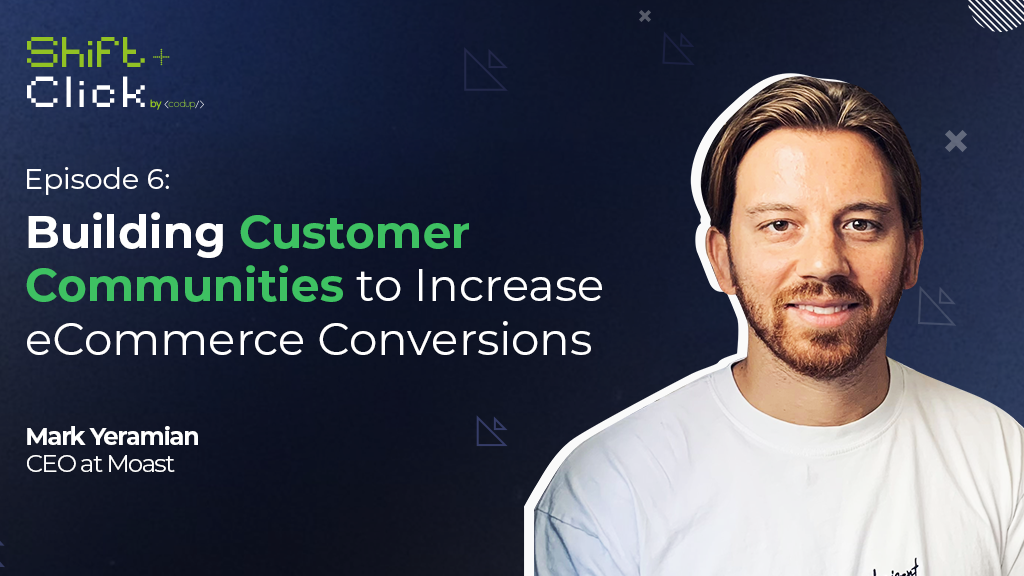Death of Keywords: How AI Could Redefine Search

In the fourth episode of Shift-Click, we invited Justin Leigh, the founder of Workflow Labs. His knowledge and interest in eCommerce and search algorithms have led us to uncover how the changing market landscape and introduction of chatbots such as ChatGPT and Bard are affecting marketing strategies.
Listen to the podcast using the following link.
About Justin Leigh, Founder of Workflow Labs
Justin, a former Amazonian, unlocked the secrets of the eCommerce titan. Honing his skills and inspired by this understanding of the industry, he ventured into ideoclick, which quickly became the guiding light for brands seeking to conquer the Amazonian wilderness.
But his entrepreneurial journey doesn’t end there. He founded Workflow Labs which specializes in solving eCommerce management challenges with software automation. His vision is rooted in empowering businesses to transcend the confines of administrative work and explore the exciting possibilities of e-commerce. His profound understanding of the challenges faced by brands and his relentless pursuit of automation serve as testaments to his drive and innovation in transforming the e-commerce landscape.
In his article, “The Death of Keywords, and the Re-Shuffling of $500B in US eCommerce sales”, he states that over 80% of Amazon’s sales are driven by customers searching for the product using a keyword in the search bar. However, with the changing and adapting world, search has gotten a lot better. Generative search, natural language processing, and AI is replacing keyword matching and is generating incredible results.
Key Takeaways:
- AI and NLP have revolutionized search engines, enabling them to understand user intent and provide more relevant search results.
- Traditional keyword-centric optimization is being replaced by user-centric content that engages and informs potential customers.
- AI-powered search delivers personalized recommendations based on individual preferences, search history, and behavior, improving the overall user experience.
- SEO professionals need to align their strategies with user intent, leverage NLP capabilities, and prioritize user satisfaction to succeed in the AI-driven search landscape.
- AI technology is also reshaping PPC marketing, with automated bidding, predictive analytics, personalization, ad optimization, and audience targeting being key areas of impact.
- Adapting to AI-driven PPC marketing can yield benefits for advertisers, including efficient bid management, improved ad performance, and higher conversion rates.

The Evolution of Search Landscape
Search is painful. However, it has come a long way since Ask Jeeves, and Lycos. They were once household names like Google is today. Similarly, the world of search has evolved from simple keywords to a complex, data-driven ecosystem that is constantly changing.
Today search results depend on user behavior. As the user behavior changes, so does the search landscape. Voice search is another example that makes search relevantly easier. Then AI is integrated into search algorithms which have heavily impacted the search landscape.
As a result, search engines are now able to understand the search intent of a query and provide more personalized and relevant search results. This has heavily affected SEO, setting up new trends for professionals to follow.
The Impact of AI and NLP on Product Search in eCommerce
Talking about product search, traditionally it relied on keyword matching, where the user entered a specific keyword or phrase and a list of products would appear as a result of the query. However, today, the integration of AI into search engines and the ability of search engines to understand users’ search intent has completely overturned how things used to work. Here are three key changes that Justin pointed out in the podcast:
- Natural Language processing is the reason for a divorce between character matching from keywords. This has allowed search engines to understand the concepts that users are expressing rather than just matching characters. This enables a better understanding of user intent and improves the relevancy of search results.
- As said above, the integration of AI in search algorithms can personalize search results based on individual user experience and search history. This means different users searching for a product using the same keyword can see different results based on their personal interests and needs.
- The iterative nature of the search, as seen in chatbots like ChatGPT, allows for progressive and contextual search queries. Instead of relying solely on individual keywords, the search engine can understand the progression of a user’s search and provide more relevant results over time.
What Makes AI-driven Search Good for SEO Professionals
AI-powered search transforms the SEO landscape by prioritizing user-centric content, personalizing search results, and reducing the influence of brand recognition in product search. Let me elaborate.
Thinking of traditional SEO, keyword-centric optimization was the primary focus for SEO professionals, leading to repetitive and often irrelevant content. However, the advent of natural language processing (NLP) and AI revolutionizes this approach.
And as said above, with NLP, search engines can understand the meaning behind the user queries and match them with relevant content, disregarding the need for an exact keyword match. This shift allows copywriters to prioritize user-centric copy that engages and informs potential customers, rather than merely targeting search engine algorithms.
Not just that, AI-powered search delivers a more personalized and tailored experience. Instead of generic search results, AI algorithms consider individual user preferences, search history, and behavior to provide personalized recommendations. This level of personalization improves the overall user experience and increases the likelihood of conversions.
While AI-powered search offers benefits, it also poses challenges for SEO professionals. Startups and small brands heavily reliant on traditional keyword strategies may struggle to compete with more established brands. The focus shifts to delivering the best products and capturing consumer trust rather than winning search rankings through keyword optimization.
Therefore, it has become crucial for B2C and B2B ecommerce brands and businesses to adapt their SEO strategies to align with user intent, leverage NLP capabilities, and emphasize user experience and satisfaction.
The Future of PPC with AI Involved
There is no doubt that everything in the digital field including Pay-per-click marketing is affected by AI and machine learning. It is true that PPC advertisers may come under a threat as the advertising landscape changes towards a personalized and AI-driven approach, but adapting to it may also enable them to reap its benefits.
Here is how AI technology is expected to revolutionize the PPC marketing
- Automated Bidding Strategies: AI and ML help advertisers set rules for their campaigns, determining how much they are willing to bid for different keywords or placements. This allows for efficient and automated management of bids based on relevance.
- Predictive Analytics: By analyzing past campaign data, AI and ML can make predictions about future performance. Advertisers can uncover valuable patterns and trends that inform their decisions on keyword selection and bidding amounts.
- Personalization: AI and ML enable the creation of personalized ads tailored to individual users. By analyzing user data, such as search history and preferences, advertisers can deliver more relevant ads, resulting in higher conversion rates.
- Ad Optimization: Through machine learning algorithms, AI can optimize various aspects of ads, including images, headlines, formats, and placements. By analyzing past campaign data, advertisers can identify the most effective elements and make adjustments for improved ad performance.
- Audience Targeting: AI and ML assist in identifying and targeting specific user groups based on their interests and behaviors. Advertisers can leverage machine learning algorithms to pinpoint users who are most likely to be interested in their products or services, allowing for more effective ad targeting.
The Winners and Losers
As AI and NLP completely take over the search landscape, there will be some winners and some losers. Businesses that are only reliant on long tail keyword optimizations will lose. Businesses that focus on winning consumer trust and confidence and create user centric content will definitely win.
SEO professionals who don’t upgrade themselves and are still following the old tricks will lose. Tools used for SEO will clearly lose market share unless they roll out features that help marketers optimize their website and content for the user.

Conclusion
All in all, it can be said that AI and natural language processing (NLP), has transformed the landscape of e-commerce and how brands used to market their products. Keyword-centric optimization is no longer the sole focus for SEO professionals. Instead, the emphasis now is on user-centric content, personalization, and delivering an exceptional user experience. Therefore, brands and businesses need to adapt their SEO strategies and prioritize user satisfaction over search engine rankings. While AI poses challenges for startups and small brands, it also presents opportunities for more established brands to capture consumer trust and loyalty.



